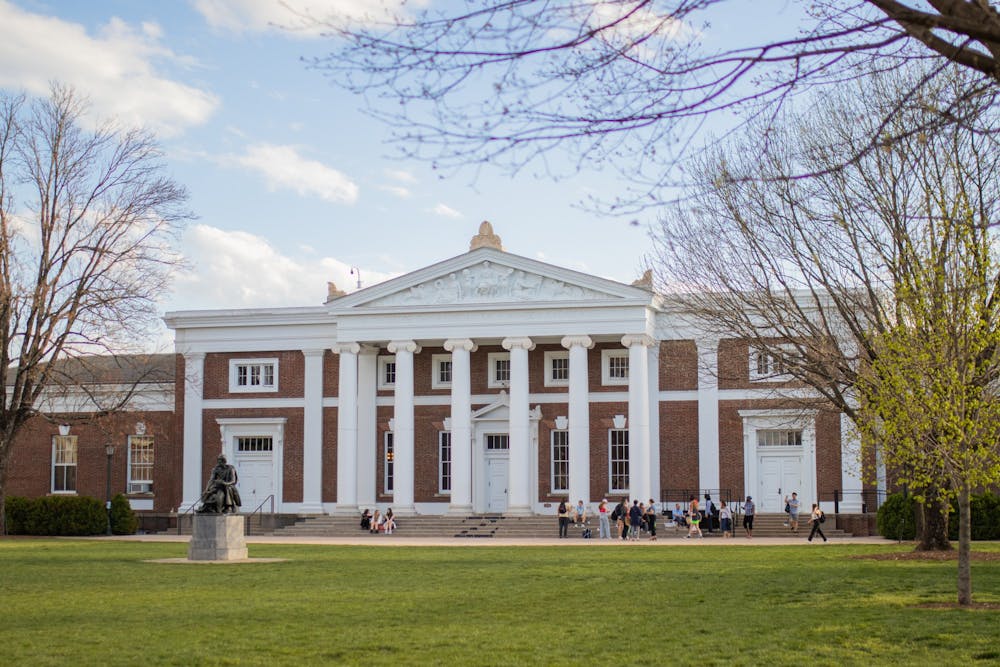The Board of Visitors’ Buildings and Grounds Committee met last March to discuss upcoming changes to Grounds. Perhaps the most eye-catching of the proposed adjustments is the approval to rename Maury Hall to Warner Hall. The new namesake for the hall — which houses classrooms and the Naval Reserve Officers’ Training Corps program — is now Senator John Warner. His name replaces Matthew Fontaine Maury, a Confederate naval officer with no specific connection to the University. This change is the latest in a series of decisions made by administration to redress its racist roots. While progress has occurred, now is not the time to be satisfied. The University administration needs to follow through on this commitment to change in earnest — and that means renaming Cabell Hall.
For years, students and community members calling for the University administration to change have been told that renaming these buildings is a slippery slope and that erasing history is dangerous. Only a few years ago, Maury’s name and face could be found on buildings and statues all across Virginia. That all began to change with the George Floyd protests in the summer of 2020, as James Madison University renamed their Maury Hall and Maury’s statue was removed from Richmond’s monument avenue. In reaction to this and similar events, some states went as far as to pass laws protecting the names of buildings from being changed, claiming their efforts were to “preserve history.” But the renaming of Maury Hall along with the Curry School of Education and Ruffner Hall on Grounds went on without a hitch. Using this same process, Cabell Hall should be next on the administration's list.
Situated at the south end of the Lawn, Cabell Hall currently serves as both the literal and metaphorical center for academia on Grounds. Joseph Cabell, the namesake of the two main academic buildings on Grounds, once said on education that “it was important to educate Virginians, and other southerners, in an institution that understood and ultimately supported slavery.” This information is not at all hidden — it is in the University’s library. Papers show that Cabell and his family owned 1,200 enslaved laborers and were avid believers in the continuation of enslavement. And this man’s family name is plastered on perhaps the most important academic building on Grounds.
Hate is woven into the very bricks and mortar of Old Cabell Hall. Thomas Jefferson left the south Lawn open in his original design of the academical village. Beginning in the 1830s, free Black people began moving to the area just south of the academical village. By 1860, the community was called “Canada,” a reference to the number of free Black people living there. In the 1890s, the University administration designed Old Cabell Hall at the end of the south Lawn to block “the area immediately to the south of the University’s land and in full view … filled with unsightly houses.”
Inaction is action. When the University fails to remove the names of men we know are dangerous and evil, it is fostering an environment in which the legacy of men like Cabell is altered, glossing over the hate he spewed and stood for. The University has a rich and long history. In a day’s walk across Grounds, you can pass the Lawn rooms of Edgar Allen Poe and Woodrow Wilson, panels of the Berlin Wall and land once owned by James Monroe. I am not suggesting taking any action to erase that history, but I think it is due time we focus on some stories which have not seen the light of day.
For instance, Louise Stokes Hunter was the first Black woman to graduate from the University, achieving a doctorate in education in 1953. Her story is one of resilience, strength under pressure and perseverance — all the kinds of qualities that we should be honoring at the University. The University should take immediate action to begin the process of renaming Cabell Hall, and I think Hunter is the perfect candidate. The impact of Black women on the University’s history is far greater than what is displayed on Grounds. As of the writing of this article, very few Black women have their names displayed anywhere on Ground. Recognizing Hunter’s importance to the University’s history is the first of many steps to acknowledge the presence of Black people at the University and all the work they have done and continue to do.
If we want to continue to be the groundbreaking leader in education we claim to be, it is time for change. Fears that removing Cabell’s name from the hall will somehow erase or otherwise tarnish the history of the University are misplaced — in fact it will have the opposite effect. The history of the University stems back to 1819 and is littered with stories just like Hunter’s, they just never see the light of day. It is far past time for these stories to get some light — a small step to help make the way we portray the history of the University more accurate.
Dan Freed is a ViewPoint Writer for The Cavalier Daily. He can be reached at opinion@cavalierdaily.com.
The opinions expressed in this column are not necessarily those of The Cavalier Daily. Columns represent the views of the authors alone.







